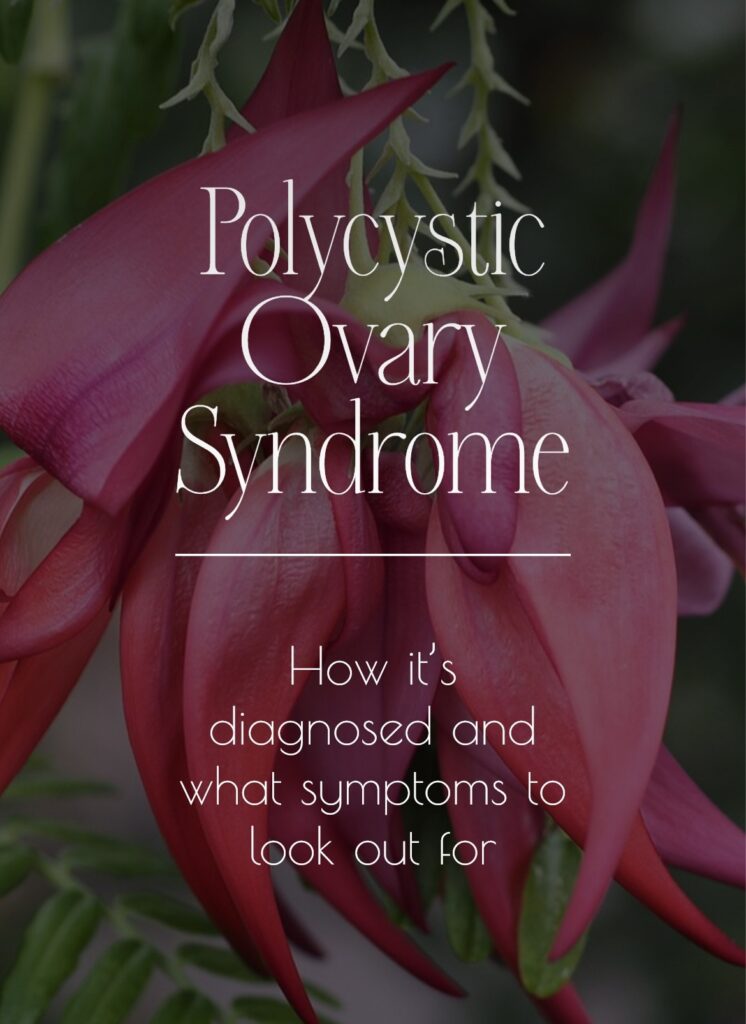Are you wondering if you might have Polycystic Ovary Syndrome (PCOS)? In this article, we’ll cover the key symptoms of PCOS and what to expect during the diagnostic process.
Polycystic Ovary Syndrome (PCOS) is a common condition, affecting up to 20% of women* and girls* of reproductive age. The good news is, that with a clear understanding of what’s happening in your body and the right combination of lifestyle changes and medical treatments, PCOS is usually very manageable.
What causes PCOS?
Insulin resistance is thought to be be a key mechanism in PCOS. Insulin the hormone that helps move glucose (sugar) from the bloodstream into your body’s tissues. Whilst not everyone with PCOS is overweight, sometimes PCOS features can appear or worsen alongside weight gain. With weight increase, resistance to insulin in the adipose (fat) tissue can cause the body to produce more insulin to keep the blood sugars normal. The higher insulin levels can overstimulate the ovaries, leading them to grow multiple follicles each month instead of usual single egg follicle growing to the point of ovulation, hence giving the polycystic appearance on an ultrasound. This can be associated with irregular ovulation and thus irregular periods. The over-stimulated ovaries can also produce too much testosterone which can lead to symptoms like acne and hirsutism (increased hair growth on the face or body).
Symptoms and Diagnostic Criteria of PCOS
The polycystic ovary syndrome is diagnosed on the presence of at least two out of the following three criteria:
1. Infrequent Periods
2. High androgens (testosterone or related hormones such as DHEAS) or symptoms of high testosterone such as acne or hirsutism
3. Polycystic ovary appearance on ultrasound: Remember, the ultrasound appearance is only one of 3 criteria. This appearance alone doesn’t mean you have the polycystic ovary syndrome, as around 20% of women* may have a polycystic-type ovary appearance without any other symptoms or health issues. Another reason for doing the ultrasound is to check for thickening of the uterine lining (endometrium). Thickening of the lining can commonly in PCOS especially if periods are not regular. The concern is that the thickened lining may harbour abnormal cells, so it is always important to see your doctor if your periods are not regular (whether infrequent or too frequent).
PCOS is a provisional diagnosis in the teenage years
The ultrasound ovary appearance is not considered useful for diagnosis within the first 8 years of periods starting. For this reason and the fact that acne is so common in the teenage years that it can be considered a normal variant, PCOS is considered a tentative or provisional diagnosis when made in the teenage years/within the first 8 years of periods starting. If you are diagnosed with PCOS in your teens and started on hormonal contraception, we recommend seeing a doctor to discuss coming off the hormonal contraception in your early 20s for reassessment to see if the signs and of PCOS persist. Blood tests and ultrasound can be done from 6-8 weeks after stopping the combined contraceptive pill.
When to see your doctor
To summarise, common symptoms of PCOS include irregular periods, acne, excessive hair growth on the face and/or body. Other symptoms might include hair thinning of the scalp. Sleep apnoea is thought to occur more commonly in people with PCOS. If you have these symptoms see your doctor to discuss whether you might have PCOS.
What to expect during the diagnostic process
Your doctor will ask about your symptoms, and may undertake an examination, ultrasound of the pelvis and some blood tests in order to determine which of the 3 diagnostic criteria are met. Your GP may undertake these tests or may refer you to an endocrinologist or Specialised GP.
Whilst a diagnosis of PCOS can be daunting, you could see it as an opportunity to take control of your health. The treatment plans are highly individualized, based on your specific symptoms, how much they affect you, and your personal goals—whether that’s managing fertility, achieving effective contraception, or improving overall health. Look out for our next blog article about treatment options for PCOS!
We have recently launched our Specialised-GP menopause Consult Service. ERH Associates GPs are trained by supported by our Endocrinologist team to provide a more cost-effective option for PMS, PMDD, PCOS and menopause consults, usually with a shorter waiting time to the appointment. If you would like to see an ERH Associates Womens Health GP or Endocrinologist, ask your usual GP to send a referral. Care of other health issues will remain with the usual GP. More information here: https://erhassociates.co.nz/womens-health-gp-service

Comments +